The fruit grapes (Vitis vinifera) may support a wide range of wellness outcomes thanks to their rich nutritional profile and bioactive compounds. Understanding the benefits of grapes is important because they are a widely available, versatile fruit that can easily be incorporated into a balanced diet. In this article you’ll find key nutrients, 10 evidence-based benefits, recommended servings, and practical tips to include grapes for overall wellness.

What Are Grapes?
Grapes (Vitis vinifera) are small, sweet, and juicy berries that grow in clusters on woody vines belonging to the Vitaceae family. They are among the oldest cultivated fruits in the world, with origins tracing back over 6,000 years to the Mediterranean and Middle East. Today, grapes are enjoyed globally in both fresh and processed forms—such as raisins, juice, and wine.
There are three primary types of grapes based on color and composition:
- Red or Purple Grapes: Rich in anthocyanins and resveratrol, compounds linked to antioxidant and heart-supportive effects.
- Green (White) Grapes: Milder in flavor, lower in pigment compounds but still provide vitamin C and hydration.
- Black Grapes: Contain high levels of flavonoids and phenolic acids, which contribute to their deep color and potential cell-protective properties.
In nutrition science, grapes are highly valued for their abundance of polyphenols, natural antioxidants that may support cardiovascular, metabolic, and cellular health. These compounds have been widely studied for their contribution to healthy aging, oxidative balance, and inflammation control.
Sources: Harvard T.H. Chan School of Public Health – The Nutrition Source: Grapes | Grapes from California – Health Research

Nutritional Profile of Grapes
Grapes provide an impressive array of essential nutrients, hydration, and plant-based compounds that promote overall wellness. Their high water content and natural sweetness make them a refreshing, low-fat fruit suitable for most balanced diets.
Below is the nutritional composition of raw, seedless grapes per 100 g, according to the U.S. Department of Agriculture (USDA) FoodData Central (2024 update):
| Nutrient | Amount (per 100 g) | % Daily Value (Approx.) |
|---|---|---|
| Calories | 69 kcal | — |
| Water | 80.5 g | — |
| Carbohydrates | 18.1 g | — |
| Dietary Fiber | 0.9 g | 3% |
| Sugars (natural) | 15.5 g | — |
| Protein | 0.7 g | 1% |
| Fat | 0.2 g | — |
| Vitamin C | 10.8 mg | 12% |
| Vitamin K | 14.6 µg | 12% |
| Potassium | 191 mg | 5% |
| Copper | 0.13 mg | 14% |
| Manganese | 0.07 mg | 3% |
(Data Source: USDA FoodData Central – Grapes, raw)
Grapes are also naturally rich in polyphenols, flavonoids, and resveratrol—bioactive compounds concentrated mainly in the skin and seeds. These plant nutrients are responsible for many of the fruit’s antioxidant and anti-inflammatory effects.
According to the Harvard T.H. Chan School of Public Health, regular consumption of polyphenol-rich foods like grapes may support heart health, improve vascular function, and contribute to long-term metabolic balance.
10 Proven Benefits of Grapes
Fresh grapes are more than a refreshing snack—they’re packed with phytonutrients, vitamins, and minerals that contribute to overall wellness. Below are ten science-backed ways grapes may support your health when included as part of a balanced diet.
1. Antioxidant Support

Grapes are rich in plant compounds such as anthocyanins, proanthocyanidins, and stilbenes (including resveratrol) that may help reduce oxidative stress and protect cells from free radical damage. These bioactives are concentrated in the skins and seeds of red and purple varieties.
Research published in the Journal of Agricultural and Food Chemistry and Frontiers in Nutrition found that grape polyphenols exhibit potent antioxidant effects comparable to those of vitamin E and C, supporting overall cellular and vascular health.
Sources: PubMed Central (PMC)
2. Cardiovascular Wellness
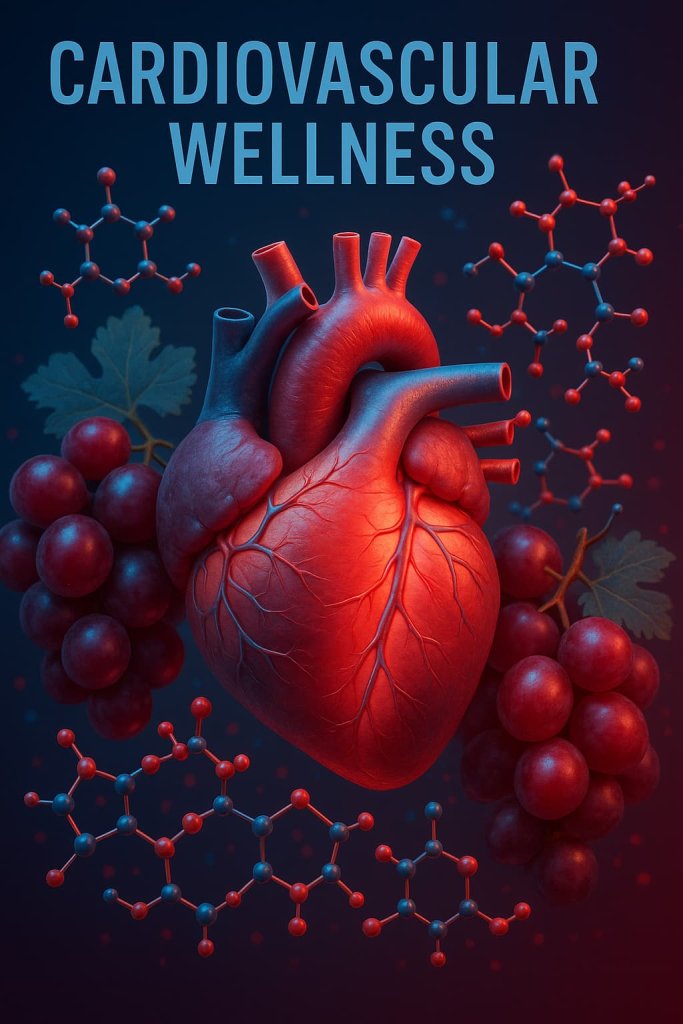
Regular consumption of grapes or grape-derived products may support heart health by improving blood vessel flexibility, promoting healthy blood pressure, and reducing oxidation of LDL (“bad”) cholesterol.
A 2022 study reported by Grapes from California noted improved endothelial function among participants who consumed grapes daily. Similarly, Medical News Today highlights that the potassium and vitamin K in grapes help maintain normal blood pressure and support cardiovascular function.
3. Blood Sugar and Metabolic Balance
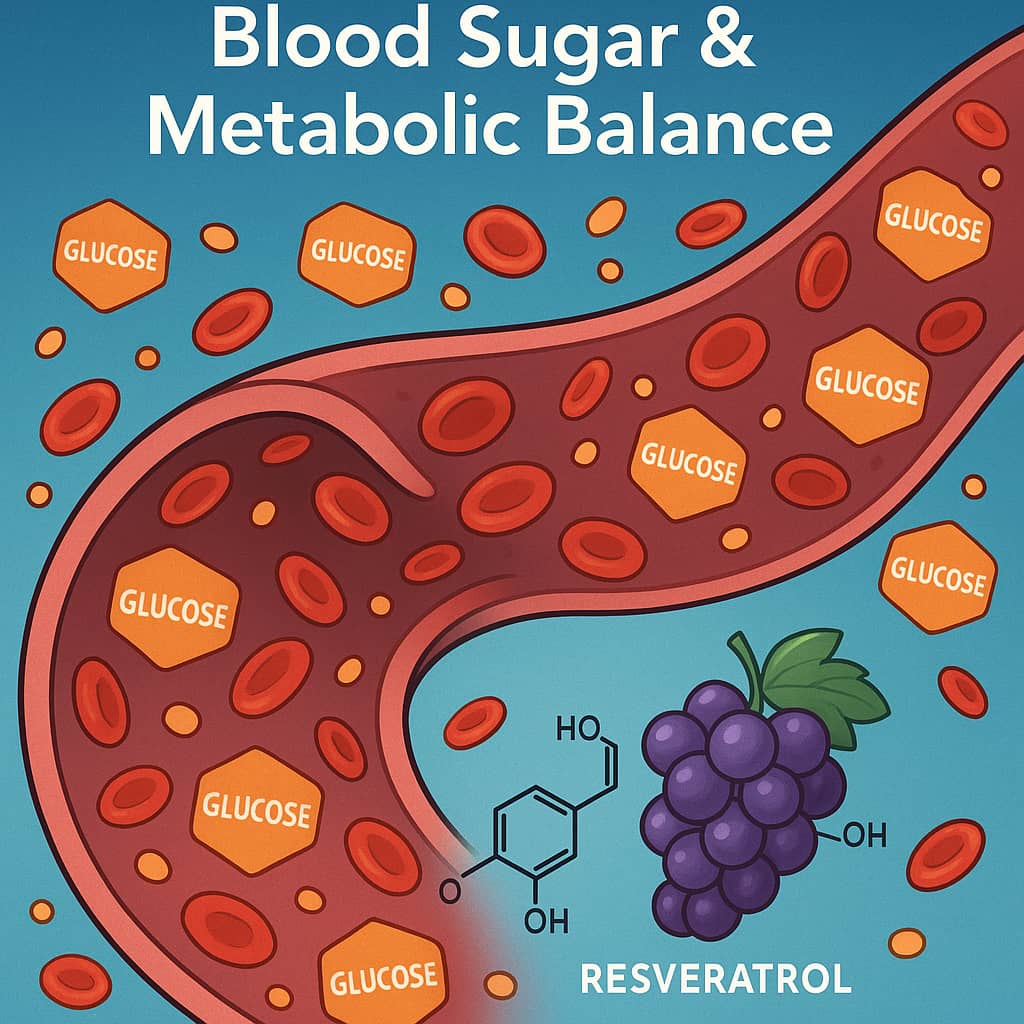
Although grapes contain natural sugars, their fiber and polyphenols may help regulate blood glucose levels when eaten in moderation. The antioxidants resveratrol and catechins have been shown to enhance insulin sensitivity and glucose uptake, supporting metabolic wellness.
A 2023 Frontiers in Nutrition review observed that grape polyphenols improved insulin function and reduced oxidative stress markers in individuals at risk of metabolic syndrome.
Source: PubMed Central (PMC)
Still, those managing diabetes or insulin resistance should practice portion awareness and combine grapes with protein or healthy fats to stabilize post-meal glucose.
4. Gut and Microbiome Support

The fiber and polyphenols in grapes may support digestive health by nourishing beneficial gut bacteria. Once digested, these compounds produce metabolites that promote microbial diversity and intestinal barrier strength.
According to a 2022 analysis in Frontiers in Microbiology, grape polyphenols enhance short-chain fatty acid (SCFA) production, a marker of gut wellness.
Source: PubMed Central (PMC)
5. Skin Health and Membrane Integrity

Grapes contain antioxidants like resveratrol and vitamin C that may support skin health by protecting collagen, elastin, and cell membranes from oxidative stress. Regular intake may help maintain elasticity and protect against UV-induced damage.
Medical News Today notes that grape seed extract is particularly high in proanthocyanidins, which are associated with reduced skin inflammation and improved appearance.
6. Cognitive Function and Brain Health

Emerging research suggests grape polyphenols may help protect neurons from oxidative stress and support brain signaling pathways involved in memory and focus.
A 2022 Healthline review summarized findings where adults who consumed grape extract showed measurable improvements in memory and attention compared to placebo groups. These effects are linked to enhanced cerebral blood flow and antioxidant protection.
Source: Healthline
7. Liver and Organ Health Support
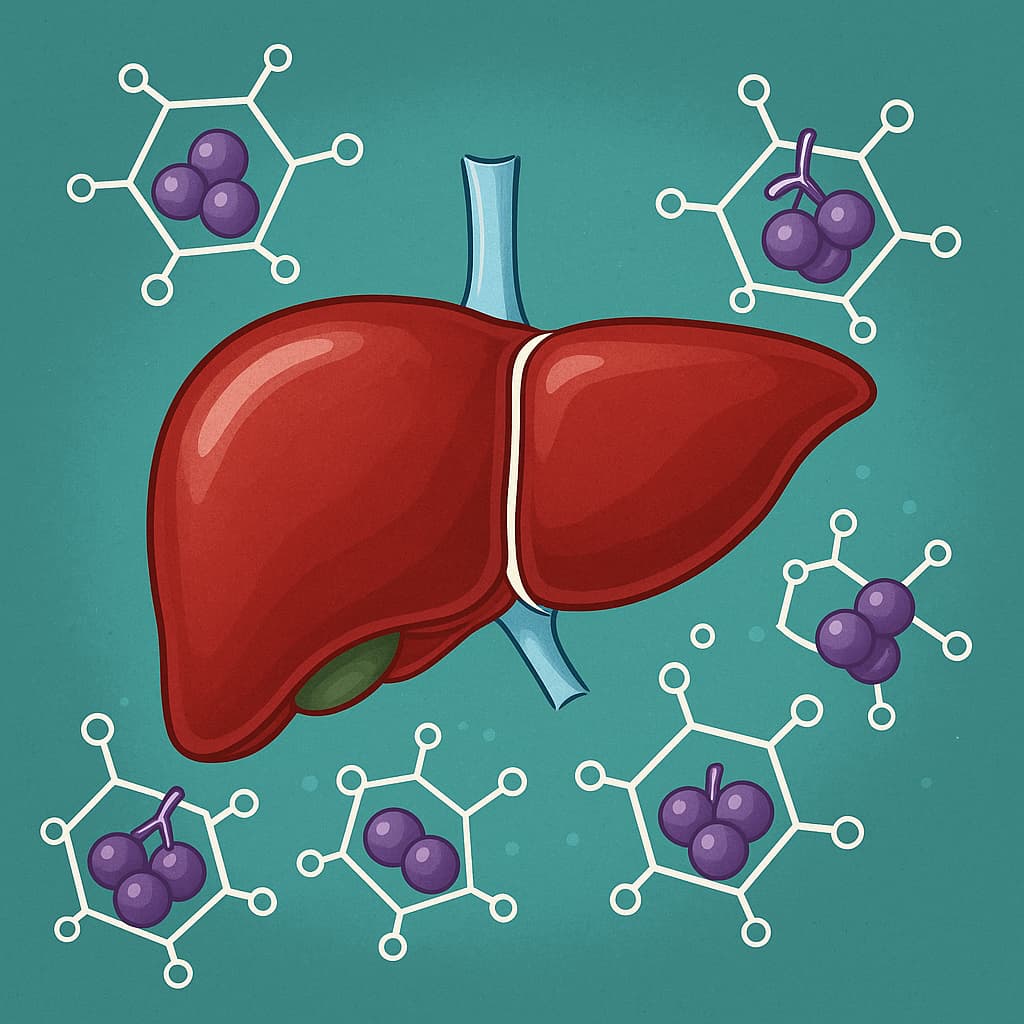
Bioactive compounds in grapes—including resveratrol, quercetin, and procyanidins—have been studied for their role in promoting liver resilience and reducing lipid accumulation. Grapes may support the body’s natural detoxification processes by combating oxidative stress.
An article in MDPI Antioxidants (2023) reported that grape-derived antioxidants reduced inflammatory markers and improved liver enzyme profiles in animal and human studies.
Source: MDPI – Antioxidants Journal
8. Bone and Mineral Support
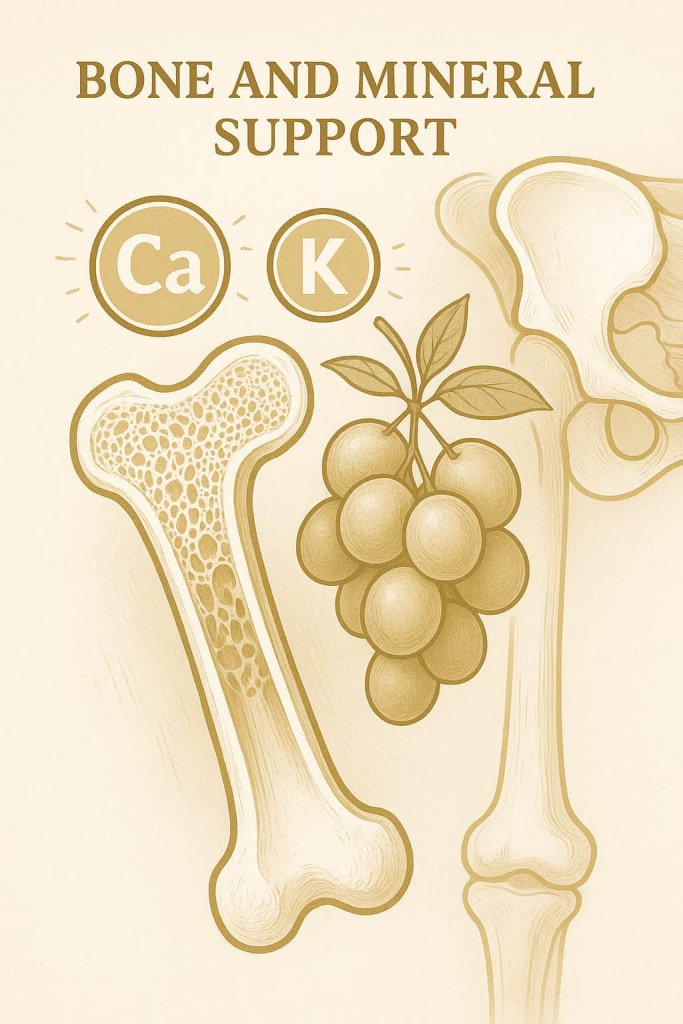
Grapes contain vitamin K, potassium, and trace minerals, all of which contribute to maintaining strong bones. Vitamin K helps activate proteins required for bone mineralization, while potassium reduces calcium loss through urine.
Medical News Today notes that including grapes and other vitamin K-rich fruits may support bone density and overall skeletal strength over time.
9. Eye Health
Dark-colored grapes provide carotenoids like lutein and zeaxanthin—nutrients known to support eye health by filtering harmful blue light and protecting the retina from oxidative stress.
According to Medical News Today, the antioxidants in grapes may help slow age-related oxidative changes to eye tissues, contributing to long-term visual health.
10. Weight Management and Hydration
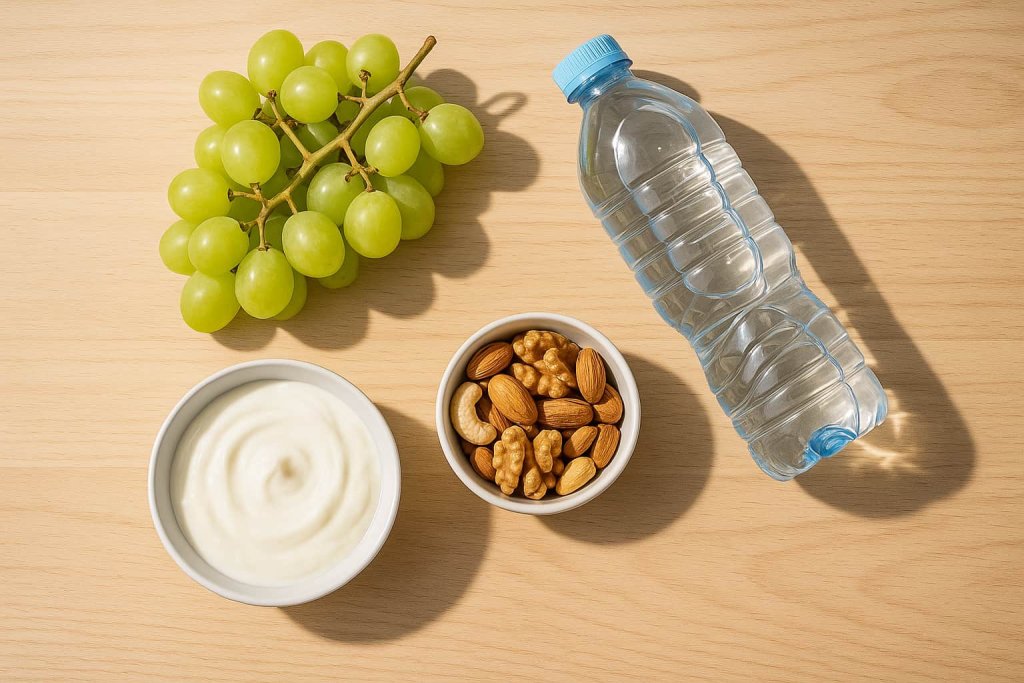
Because grapes are high in water and naturally low in calories, they can support healthy hydration and satiety. Replacing processed snacks with grapes offers a sweet yet nutrient-rich alternative that may help reduce overall calorie intake.
Health.com highlights that grapes’ natural fiber and high water content make them ideal for those aiming to maintain a balanced weight and stay hydrated throughout the day.
Scientific Compounds in Grapes
Beyond their sweet taste, grapes are rich in bioactive plant compounds that contribute significantly to their nutritional and wellness value. These compounds—collectively known as polyphenols—play key physiological roles in maintaining oxidative balance, supporting circulation, and protecting cells from everyday stressors.
Here are the major scientific compounds found in grapes and their evidence-based significance:
1. Resveratrol
Resveratrol is a naturally occurring stilbene polyphenol found mainly in the skins of red and black grapes, where it functions as a protective antioxidant compound. In human nutrition research, resveratrol is valued for its antioxidant and anti-inflammatory properties, which may support cardiovascular function, metabolic balance, and healthy aging.
According to a 2024 systematic review published in Frontiers in Pharmacology, resveratrol has been shown to influence molecular pathways involved in oxidative stress reduction, endothelial function, and vascular elasticity. The analysis of randomized controlled trials reported that resveratrol supplementation improved several markers of vascular health, including nitric oxide production and arterial flexibility—key factors in maintaining normal blood pressure and circulation.
These findings align with broader evidence indicating that polyphenol-rich foods like grapes contribute to cardiovascular resilience and overall metabolic wellness.
Source: Frontiers in Pharmacology – Resveratrol and Vascular Health (2024)
2. Flavonoids
Flavonoids are a diverse class of plant antioxidants that include quercetin, catechins, and kaempferol, all present in grape skins and seeds. These compounds may help protect cells from oxidative damage and support healthy inflammation response.
Studies from the Journal of Agricultural and Food Chemistry indicate that grape flavonoids can support endothelial (blood vessel) function, helping improve circulation and vascular relaxation.
Source: Journal of Agricultural and Food Chemistry (2022)
3. Anthocyanins
Anthocyanins are natural pigments that give red, purple, and black grapes their vibrant color. They belong to the flavonoid family and exhibit strong antioxidant activity.
A 2023 review in Antioxidants (MDPI) noted that anthocyanins may support brain, heart, and eye health by protecting tissues from oxidative stress and maintaining capillary integrity. They also play a role in promoting collagen stability, which supports healthy skin structure.
Source: MDPI – Antioxidants Journal (2023)
4. Tannins (Proanthocyanidins)
Tannins, also called proanthocyanidins, are complex polyphenols concentrated in grape seeds and skins. These compounds exhibit powerful free-radical-scavenging activity and may help support cardiovascular and immune function.
According to the Journal of Functional Foods (2023), grape seed proanthocyanidins promote endothelial relaxation and protect lipids from oxidative degradation, contributing to long-term heart health.
Source: Journal of Functional Foods (2023)
Physiological Significance
Together, these compounds work synergistically to:
- Support cellular defense systems against oxidative stress.
- Promote vascular elasticity and circulation.
- Aid in glucose and lipid metabolism, supporting metabolic balance.
- Protect tissues like the brain, skin, and eyes from oxidative damage.
These findings highlight why grapes are recognized as a functional food in nutritional science—providing both essential nutrients and bioactive compounds that contribute to long-term wellness.
References:
- USDA FoodData Central
- Harvard T.H. Chan School of Public Health – Grapes
- MDPI – Antioxidants
- Frontiers in Nutrition
How to Eat Grapes for Best Results
Incorporating grapes into your daily routine is simple, delicious, and supports a balanced diet when enjoyed in moderation. Here’s how to get the most nutritional value from them:
Recommended Portion Size
- A healthy serving of grapes is about 1 cup (≈150 g), or roughly 30–35 grapes.
- This portion provides hydration, fiber, vitamin C, and antioxidants without adding excessive sugar or calories.
- For most adults, one to two servings per day can fit comfortably within a balanced eating plan.
Best Meal Pairings
Pair grapes with foods that contain protein or healthy fats to stabilize blood sugar and increase satiety:
- Mix grapes with Greek yogurt and oats for a high-protein breakfast.
- Add halved grapes to spinach salads with walnuts or almonds for added antioxidants and crunch.
- Serve grapes with cheese or nut butter as a balanced snack that blends natural sugars with protein and healthy fats.
Storage and Food Safety Tips
To enjoy grapes at their freshest and safest quality, it’s important to follow proper storage and food-handling practices as outlined by the U.S. Food and Drug Administration (FDA). These steps not only preserve the fruit’s nutrients but also minimize the risk of foodborne illness.
1. Refrigerate Promptly
Store grapes in the refrigerator at ≤ 40 °F (≈ 4 °C) immediately after purchase to slow bacterial growth and maintain crispness. Keep them in a breathable container or their original perforated bag to allow air circulation and prevent moisture buildup.
2. Wash Only Before Eating
Avoid washing grapes before storing them—excess moisture can accelerate mold and spoilage. Instead, rinse thoroughly under clean, running water right before eating or preparing them. The FDA advises not to use soap, bleach, or commercial produce washes, as these are unnecessary and may leave harmful residues.
3. Prevent Cross-Contamination
Keep grapes and all other fresh fruits separate from raw meat, poultry, and seafood—both in your grocery bags and refrigerator. Use separate cutting boards and utensils to reduce the risk of bacterial transfer.
4. Consume Within the Optimal Time Frame
For best taste and nutritional quality, enjoy grapes within 5–7 days of purchase. Discard any that appear moldy, shriveled, or have an off odor.
Following these safety measures ensures your grapes retain their natural sweetness, antioxidants, and freshness while supporting safe food practices at home.
Source: FDA – Selecting and Serving Produce Safely
Possible Side Effects and Precautions
While grapes are widely recognized as a safe and nutritious fruit, certain precautions should be observed—especially for people with specific health conditions, dietary goals, or young children. Understanding potential risks ensures you can enjoy grapes safely as part of a balanced diet.
1. Natural Sugar Content
Grapes are naturally sweet, providing about 15 grams of sugar per 100 grams (around one cup). For individuals managing diabetes or insulin resistance, portion control is key. The National Center for Complementary and Integrative Health (NCCIH) emphasizes that fruit sugars affect blood glucose differently from refined sugars due to fiber and nutrient content, but moderation remains essential. Pairing grapes with protein or fiber (e.g., nuts, yogurt, or oats) helps slow sugar absorption and support stable energy levels.
Source: NCCIH – Type 2 Diabetes and Dietary Supplements: What the Science Says
2. Calorie Density
Although grapes are relatively low in calories (about 69 kcal per 100 g), large portions can still contribute to excess calorie intake. The Linus Pauling Institute at Oregon State University notes that while polyphenols such as resveratrol contribute to health benefits, moderation is still advised to maintain an overall balanced diet. Limiting grape intake to one cup per day is a practical guideline for most adults.
Source: Linus Pauling Institute – Resveratrol (Oregon State University)
3. Allergy Risk
Grape allergies are uncommon but possible. Symptoms may include itching, swelling of the lips or tongue, skin hives, or digestive upset. If you have known fruit allergies (such as to peaches, cherries, or kiwis), discuss grape consumption with your healthcare provider, as cross-reactivity can occur. The Mayo Clinic advises immediate medical attention if allergic symptoms develop after eating grapes.
Source: Mayo Clinic – Food Allergy Overview
4. Medication Interactions
Grapes contain resveratrol, a plant compound with mild blood-thinning properties. High intakes or resveratrol supplements may enhance the effects of medications such as warfarin (Coumadin), clopidogrel (Plavix), or aspirin. Clinical studies indicate that resveratrol can influence platelet activity and vascular signaling. Therefore, individuals taking anticoagulants or antiplatelet drugs should consult their healthcare provider before increasing grape or supplement consumption.
Source: National Center for Biotechnology Information (NCBI) – Resveratrol and Drug Interactions
5. Choking Hazard in Young Children
Whole grapes are a well-known choking hazard for toddlers and preschool-aged children due to their size and smooth texture. The American Academy of Pediatrics (HealthyChildren.org) recommends cutting grapes into quarters (lengthwise) before serving and always supervising young children during meals and snacks. This simple step significantly reduces the risk of choking.
Source: HealthyChildren.org – Choking Prevention for Children
Frequently Asked Questions (FAQ)
Q1: Are grapes good for diabetics?
Yes—when eaten in moderation, whole grapes may support healthy blood sugar control due to fiber and antioxidants that influence glucose metabolism. Stick to about ½–1 cup per serving and avoid juice or dried grapes (raisins), which are higher in sugar.
Q2: Do red or black grapes have more antioxidants?
Yes—red and black grapes typically contain higher levels of resveratrol and anthocyanins compared to green grapes. However, all varieties offer valuable nutrients and hydration benefits.
Q3: Can grapes help support heart health?
Absolutely. Grape polyphenols, particularly resveratrol, may support healthy blood pressure and cholesterol levels by improving vascular function. Studies show consistent benefits from daily grape consumption.
Source: Grapes from California – Health Research
Q4: Are grapes safe during pregnancy?
Yes—grapes are nutrient-rich and hydrating, offering vitamin C, K, and antioxidants beneficial during pregnancy. Wash thoroughly before eating, and consult your healthcare provider about portion sizes.
Q5: Can I eat grapes daily?
Yes—daily consumption of grapes (1 cup or 150 g) is safe for most people and supports hydration, antioxidant intake, and overall wellness when part of a varied diet.
Q6: What’s the healthiest way to eat grapes?
Fresh, whole grapes provide the best nutrient balance. Avoid peeling or juicing since most antioxidants are concentrated in the skin. Pair with nuts, yogurt, or oats to stabilize blood sugar.
Q7: Can grapes cause digestive issues?
Some individuals may experience mild bloating if they consume grapes in large amounts due to their fiber and natural sugar. Drinking water and eating moderate portions help minimize discomfort.
Conclusion
Grapes are a nutrient-dense fruit that may support heart health, hydration, skin vitality, and metabolic balance. Packed with antioxidants like resveratrol and anthocyanins, they complement a balanced diet and contribute to long-term wellness.
Enjoying one cup of fresh grapes daily—paired with protein or fiber-rich foods—can be a simple, delicious way to enhance your overall nutrition. Choose fresh, washed grapes, store them safely, and savor their natural sweetness as part of a wholesome lifestyle.
This content is for informational purposes only and not medical advice.
